

Open Source Ecology Documentation - Open Source Ecology. Wiki instructions. Policies A wiki is a place where a large number of people can contribute to content generation and organization.
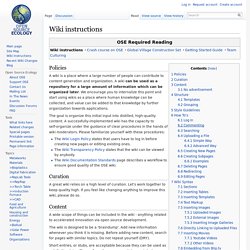
A wiki can be used as a repository for a large amount of information which can be organized later. We encourage you to internalize this point and start using wikis as a place where human knowledge can be collected, and value can be added to that knowledge by further organization towards applications. The goal is organize this initial input into distilled, high-quality content. A successfully-implemented wiki has the capacity to self-organize under the guidance of clear procedures in the hands of wiki moderators. The Wiki Login Policy states that users have to log in before creating new pages or editing existing ones. Curation. Crash course on OSE. Overview for New People Start with our Main OSE Website.
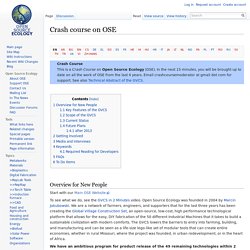
To see what we do, see the GVCS in 2 Minutes video. Open Source Ecology was founded in 2004 by Marcin Jakubowski. We are a network of farmers, engineers, and supporters that for the last three years has been creating the Global Village Construction Set, an open-source, low-cost, high performance technological platform that allows for the easy, DIY fabrication of the 50 different Industrial Machines that it takes to build a sustainable civilization with modern comforts.
The GVCS lowers the barriers to entry into farming, building, and manufacturing and can be seen as a life-size lego-like set of modular tools that can create entire economies, whether in rural Missouri, where the project was founded, in urban redevelopment, or in the heart of Africa. We have an ambitious program for product release of the 49 remaining technologies within 2 years and a 2.4M dollars budget - which we abbreviate as our 50/2/2 program. Scope of the GVCS. Team Culturing. Introduction[edit] OSE Team distributed around the world Open Source Ecology (OSE) is creating a culture of open source economic development - also known as Distributive Economics (see provocative comments on the topic in Douglas Rushkoff's Radical Abundance talk).
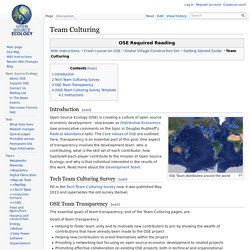
The Core Values of OSE are outlined here. Transparency is an essential part of this goal. One aspect of transparency involves the development team: who is contributing, what is the skill set of each contributor, how has/is/will each player contribute to the mission of Open Source Ecology, and why is that individual interested in the results of this work. Tech Team Culturing Survey[edit] Fill in the Tech Team Culturing Survey now. Getting Started Guide. Overview[edit] Q: How do I start contributing to OSE?
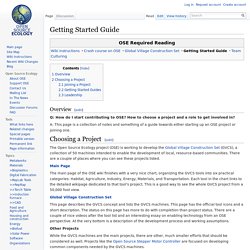
How to choose a project and a role to get involved in? A: This page is a collection of notes and something of a guide towards either starting up an OSE project or joining one. The Open Source Ecology project (OSE) is working to develop the Global Village Construction Set (GVCS), a collection of 50 machines intended to enable the development of local, resource-based communities. There are a couple of places where you can see these projects listed. Main Page The main page of the OSE wiki finishes with a very nice chart, organizing the GVCS tools into six practical categories: Habitat, Agriculture, Industry, Energy, Materials, and Transportation. Open Source Ecology. Factor e Farm. Factor e Farm is a 30 acre parcel of land 1 hour away from the Kansas City International Airport in Missouri.
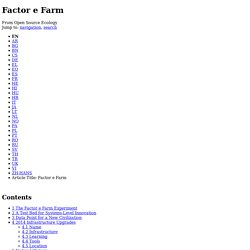
In 2004, Open Source Ecology purchased this land - a blank slate that was a soybean field. Since then, we have been busy building infrastructure, using as much open source, libre processes and hardware as possible. We are much more than a farm. At Factor e Farm, we grow ideas, and put them into practice. Factor e Farm (FeF) is a socio-technical experiment. Factor e Farm is an experiment on many levels: natural ecology, industrial production, experimental research and development, immersion education, and a transformative lifestyle.
The Factor e Farm experiments can be observed from many perspectives. The intended outcome is mastery of individual productive power towards evolving as humans - where absolute material security allows for uncompromised pursuit of personal autonomy, mastery, and purpose. Starting from raw land in 2006, the 2014 infrastructure plan is: edit Name[edit] Blog. Open Source Ecology. Dozuki. OSE Dozuki link We use Dozuki as a external presentation layer for GVCS machines and modules.
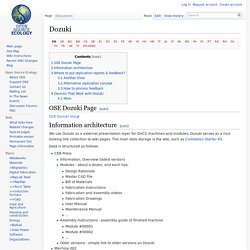
Dozuki serves as a nice looking link collection to wiki pages. The main data storage is the wiki, such as Civilization Starter Kit. Data is structured as follows: CEB Press Information, Overview (latest version) Modules - about a dozen, and each has: Design Rationale Master CAD File Bill of Materials Fabrication Instructions Fabrication and Assembly videos Fabrication Drawings User Manual Maintenance Manual ... Here is a diagram of how this looks like in Dozuki: edit/comment this drawing Using the Civilization Starter Kit, people are beginning to independently build their own Global Village Construction Set machinery throughout the world.
FeF replication is recored in nice visual way. Not very well structured Posts on various blogs will eventually get lost Difficult to find and process feedback from replicators Another View[edit] edit Alternative replication concept[edit] Proposal: Android or iOS?